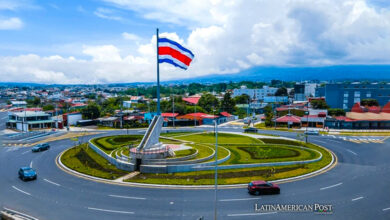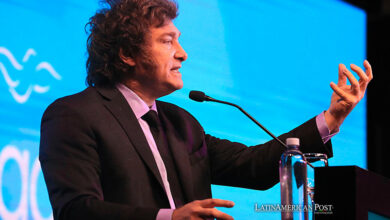The World Bank Confirms More Resources and Credits With Lower Rates for Latin America
The World Bank (WB) has launched reforms to finance projects focused on the climate crisis and the green transition in Latin America and the Caribbean .

Photo: EFE/Zipi Aragón
Ninca Osorio | EFE
Listen to this article
Leer en español: El Banco Mundial confirma más recursos y créditos con menores tasas para América Latina
The World Bank (WB) has launched reforms to finance projects focused on the climate crisis and the green transition in Latin America and the Caribbean, with more resources and lower interest rates, according to its vice president for the region, the Colombian Carlos Felipe Jaramillo.
In an interview with EFE, Jaramillo confirmed that the organization is advancing reforms to finance the region with "more resources, in some cases concessional resources", as well as with lower rates, to face the great global challenges related to climate change.
"There is talk of contributions, which would be something very new, for middle-income countries, including Latin America, on a concessional basis, that is, below the interest rates and terms that the Bank usually offers", said the vice president for Latin America and the Caribbean of the WB.
This announcement is in line with the declaration of the last G20 summit where the US president, Joe Biden, advocated for a reform of the World Bank and the IMF with the aim of offering developing economies an alternative to loans from China, main creditor of emerging countries.
With the reforms, the WB hopes to be "faster and more agile," declared Jaramillo, and also celebrated that the allocation of resources for projects that face "global challenges does not discriminate," so its benefits will reach low-income countries.
Access to credit in better conditions, even "cheaper", will be conditional on investments related to adaptation and mitigation to climate disasters (droughts, floods and hurricanes), control of deforestation, as well as financing the green transition.
In fiscal 2022 alone, the World Bank approved financing worth $10.4 billion for a total of 55 operations in the region.
Latin America returns to its agenda of "structural problems"
For Jaramillo, after the pandemic, Latin America has demonstrated "admirable macroeconomic management, in most cases very successful" because the central banks raised interest rates on time and that has allowed the inflationary outbreak to be controlled.
The growth rebound has occurred due to "an evolution of the region in the management of crises", according to Jaramillo, but that resilience has ended, because the WB forecast for 2023 will be 1.4%, and 2.4% % for 2024 and 2025, "much lower rates than what the region needs to really overcome the problems of poverty and inequality."
In his opinion, the WB has the challenge of raising growth rates, but now in a context of resurgence of the "old agenda of structural problems" of a region with low levels of production, where investment in infrastructure is required.
On the other hand, the vice president of the WB for the region explained that the institution's agenda in the region, after diagnostic evaluations, is already focused on the adaptation of countries to resist the onslaught of climate change, with the construction of resistant infrastructure, and the support for the decarbonization of economies.
But "Latin America's greatest contribution to this whole issue of mitigation would be the control of the logging of natural forests," explained Jaramillo, who has also called on multilateral financial entities to seek "joint actions."
According to the World Bank forecast, the region's debt level this year would drop from the 66.3% reached in 2022 to 64.7%.
Argentina's growth will fall 2% in 2023
The vice president of the WB also referred to Argentina and told EFE that in 2023 the Argentine economy will fall by 2%, when in 2022 it had grown at 5%, a recession that has been justified by the eight-month drought in a country dependent on exports. agricultural.
But Jaramillo was "optimistic" and added that Argentina's decline is "temporary" , due to the recovery of the climate and the potential of its natural resources such as lithium, key to the green transition.





